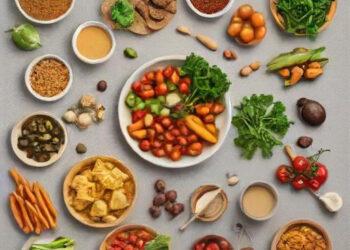-CB Edit Desk
In a major push towards ‘Atmanirbhar Bharat’, the Centre earlier this year announced a production-linked incentive (PLI) scheme for 13 key sectors with a total outlay of Rs 1.97 lakh crore. Nine sectors have already been approved for the scheme, and the remaining are in the process of obtaining a nod from the Cabinet. While this initiative is expected to benefit all the sectors in accelerating growth and employment, the food processing sector is being looked at with high hope, being a sunrise sector and having immense potential to absorb labour.
Enough evidence is available to show that India’s urban population is increasingly diversifying their food consumption towards processed food, fruits-vegetables, fish, meat, eggs and other dairy products. This move is visible among the rural population as well, albeit at a slow pace. Changing the food consumption basket along with rising per capita income, and increasing urbanisation may encourage more number of food units and investment therein. The food industry has an untapped potential in many products, particularly fruits and vegetables.

For instance, India is the world’s second-largest producer of fruits and vegetables, but hardly 2.2% of it undergoes processing. The planned outlay for food processing under the PLI scheme is about Rs 11,000 crore. The scheme is likely to create an additional output worth Rs 33,500 crore, with the potential to generate 2,50,000 additional jobs by 2026-27. While the specific eligibility criteria for it are awaited, the government plans to achieve these targets by supporting processing firms and meeting a stipulated minimum sales and investment requirement. The firms who would meet this criterion shall be extended an incentive ranging between 7% and 10% on incremental sales over the base year.
The product segments that the scheme aims to target include ready-to-cook and ready-to-eat foods, marine products, processed fruits and vegetables, and mozzarella cheese and innovative and organic products. These measures may help the organised food industry, which has been facing the problem of low-capacity utilisation. The average estimated capital-output ratio in it during mid-2015 was high at 4.89 compared to an average value of 2.07 during the eighties. It may imply that capacity utilisation in the food and beverage industry is low and such incentives may offer an opportunity to use the resources and equipment’ efficiently and hence earn profit.
Trends in organised food and beverage industry
From the Annual Survey of Industries, we find that the number of factories in organised food and beverage processing sector has increased since 2000-01 from 23,988 to 40,162 in 2017-18 and so have their investment, output and total factor productivity growth. In contrast, the number of workers has increased from 13.5 lakh to nearly 18 lakh during the same period, growing at a modest 1.7% rate per annum.
The processed food and beverage has a 17% share in the total number of manufacturing units; a 14% share in total manufacturing employment and a 9% share in total gross value added (GVA) in manufacturing. The share of firms and hired labour (employment) is much higher in unorganised micro and home-based processing units but tends to have a very low share in GVA.
A higher employability in the unorganised enterprises may be explained by the fact that food processing is a traditional sector that has strong backward linkages with agriculture. Most of the establishments are engaged in primary processing of wheat, paddy, oilseeds and spices and significantly contribute towards self-employment and labour absorption.
Falling labour intensity and other challenges
The PLI scheme is a step in the right direction. However, the major concern remains regarding the perceived impact of the scheme on generating large-scale employment. Sluggish growth in employment is explained by a steady fall in labour intensity. Simply put, labour intensity is the proportion of labour used relative to the capital stock to produce the output. A declining labour intensity shows an increased substitution of labour with capital; output increases, but it does not generate enough employment.

Labour intensity has plummeted consistently in processed food and beverage industry from 0.68 during the 1980s to 0.10 in recent years. It is slightly above 0.06, the average estimated for overall manufacturing, implying that processed food has the potential to absorb people, albeit at a slower pace.
The PLI, which is mainly a sales-linked incentive scheme, may end up increasing the speed of this substitution of labour with capital and hence contribute to a further decline in labour intensity. The real challenge, therefore, is to accelerate employment, which is possible only if structural issues responsible for declining labour intensity are addressed. Increasing automation and mechanisation of production and rising wage to the rental price of capital have badly hit demand for labour.
The unskilled and low-skilled workers are at the margins. The government must focus on creating employment opportunities, perhaps through increasing the pace of skills and training in the workforce. Incentives should also be given to firms engaged in subcontracting with the unorganised micro and small establishments for raw material or intermediate products.
The organised food and beverage industry face many other challenges which deserve attention: production and packaging is expensive; safety and quality management procedures are inappropriate; access to regular finance is poor; the investment in transport and cold chain infrastructure for perishables is inadequate; technology adoption is poor; and the produce is not competitive in world markets.
While the PLI scheme is a welcoming policy initiative to boost the processing industry, it may not immediately translate into creating productive jobs, unless well targeted policies are adopted to address the structural factors that inhibit its employment growth.
This analysis is from The Wire written by Seema Bathla, a Professor at the Centre for the Study of Regional Development and Prateek Kukreja, consultant at ICRIER, New Delhi.
Statistics quoted are sourced from Seema Bathla and Elumalai Kannan’s edited volume Agro and Food Industry in India: Inter-sectoral Linkages, Employment, Productivity and Competitiveness, Springer Nature, Singapore, 2021.






